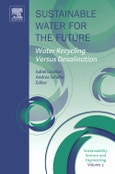This book is part of a series on sustainability. Specifically, it deals with the issue of sustainable water use. Fresh sources of potable water are being depleted across the world. Pure water is the goal of water utilities as well as several industries. Well past the experimental stage, membrane processes are now a proven and reliable method of providing high-quality, cost-effective water. Membrane technologies have immediate applications to treatment of fresh, brackish and sea waters, as well as wastewater reclamation. With innovative module design and engineering, micro- and ultra-filtrations have become effective and economical for drinking water production, particularly for removal of microorganisms. Membrane bioreactors are being developed for municipal and industrial water recycling. Various membrane processes are also used to remove contaminants from industrial wastewaters.
This book covers the fundamental and practical concepts and issues regarding the application of membrane technologies for sustainable water treatment. It describes and compares the effectiveness of desalination versus water recycling for long-term sustainable water use.
Please Note: This is an On Demand product, delivery may take up to 11 working days after payment has been received.
Table of Contents
An Overview of the Global Water Situation Global Desalination Situation Global Water Recycling Situation Desalination Reverse Osmosis and Membrane Distillation Salinity Gradient Energy Ion-Exchange Membrane Processes in Water Treatment Micropollutants in Water Recycling: A case study of N-nitrosodimethylamine (NDMA) exposure from water versus food TiO2-Based Advanced Oxidation Nanotechnologies for Water Purification and Reuse Membrane Bioreactors Theory and Applications to Wastewater Reuse Concentrate Treatment for Inland Desalting Inland Desalination: Current Practices, Environmental Implications, and Case Studies in Las Vegas, NV Renewable Energy Powered Water Treatment Systems Desalinated Versus Recycled Water What Does the Public Think? Conclusion A Summary of Challenges still Facing Desalination and Water Reuse Index
Authors
Isabel C. Escobar University of Toledo, Chemical and Environmental Engineering Department, U.S.A.. Andrea Schäfer Institute for Infrastructure and Environment, University of Edinburgh, UK. Andrea Schäfer is Professor of Water Process Engineering, Faculty of Chemical and Process Engineering as well as Head of Membrane Technology Department, Institute of functional Interfaces (IFG) at the Karlrsruhe Institute of Technology. Previously she was Professor at the Nelson Mandela African Institute of Science and Technology in Tanzania, East Africa. 2006 to 2013 she was the Chair of Environmental Engineering at the University ofEdinburgh, Scotland, UK following 3 years as a senior lecturer at the University of Wollongong, Australia and 3 years as postdoc then lecturer at the University of New South Wales, Sydney Australia. She holds four engineering degrees in three different languages (English, German & French) including a PhD from the University of New South Wales and has worked in many countries. Passionate about membrane process engineering she has experience with several membrane processes encompassing predominantly water treatment, desalination, water recycling, remote water supplies and
international development. Her work spans from fundamental research to commercialisation projects. Prof Schäfer has published extensively in high impact journals and authored or edited several books, including 'Nanofiltration: Principles and Applications'. She collaborates extensively with developing country researchers, industry as well as colleagues in many leading academic institutions.








